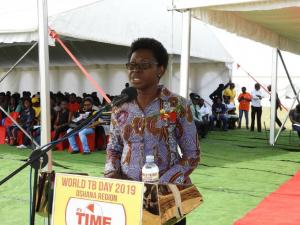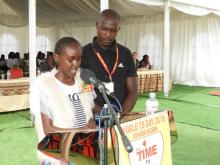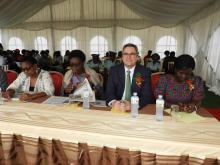World TB Day 2019
Global leaders met in September last year to set a roadmap for accelerated action to end TB in line with the sustainable development goals. This year’s World TB Day theme ‘It’s time’ – puts the accent on the urgency to act on the commitments made by global leaders to: scale up access to prevention and treatment; build accountability; ensure sufficient and sustainable financing including for research; promote an end to stigma and discrimination, and promote an equitable, rights-based and people-centered TB response. Despite being declared a major public health concern 20 years ago by WHO, TB remains amongst the top 10 killers globally.
Speaking at the World TB day commemoration, the Deputy Ministry of Health and Social Services, Honorable Julietha Kavetuna, said that Namibia needs to use this day to re-commit to ending TB since the country has been amongst the top ten countries with the highest per capita burden of TB in the world. She noted some progress in the country’s efforts to end TB. In 2018, Namibia notified 8,100 patients with TB and of these, more than 714 were children under the age of 14years. These numbers show a decline of about 3% compared to the previous year. 84% of new patients commenced on treatment in 2017 were successfully treated. While this is relatively high, there is need for all of us to combine our efforts to make sure that all patients who commence TB treatment are successfully treated as the WHO target remain at 90%. I wish to specifically urge all Regional Directors to provide unconditional support to our nurses who are working as District Tuberculosis and Leprosy Coordinators in all the 35 districts. In countries that have been successful in combating TB, these cadres have played a pivotal role.
In a statement read on his behalf, WHO Representative, Dr. Charles Sagoe-Moses, called upon government and civil society leaders at all levels to take leadership in combating the TB epidemic in the country. TB is a major challenge to development, causes untold human suffering, and threatens the achievement of the 2030 Agenda for Sustainable Development. Current levels of investment by national governments towards TB care and prevention must be increased as they currently fall far short of levels required to end the epidemic by the end date of the Sustainable Development Goals, Dr Sagoe-Moses said.
The 2018 WHO Global Report indicates that the disease burden caused by. TB is falling globally, in all WHO regions, and in most countries, but not fast enough to reach the first milestones of the End TB Strategy in 2020. In the WHO African Region, declining cases of TB cases (4% per year) placed it second among all WHO regions over the period between 2013 and 2017. Also, particularly impressive reductions (4–8% per year) have occurred in southern Africa (e.g. Eswatini, Lesotho, Namibia, South Africa, Zambia and Zimbabwe), following a peak in the HIV epidemic and the expansion of TB and HIV prevention and care.
Namibia commemorated the World TB Day on 28 March 2019 in Oshakati.









